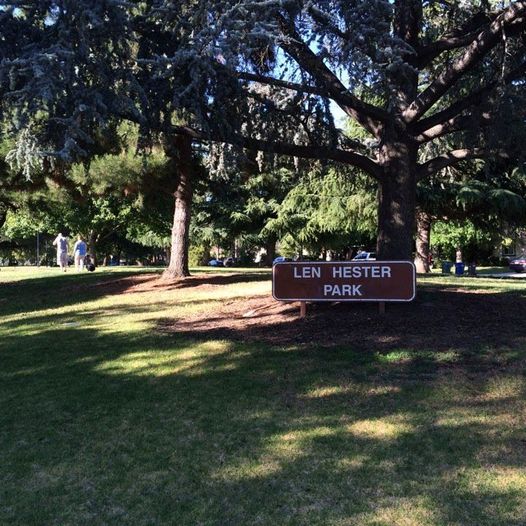Heads up for trail and park users near Len Hester Park in Concord (end of Bancroft Rd.). An environmental contractor for the Contra Costa County Department of Conservation and Development is going to install groundwater injection wells near the Iron Horse Corridor, Len Hester Park, and Stimel Drive in Concord. Work will begin on Monday, Nov. 4 and last through Tuesday, Jan. 7, barring unforeseen circumstances. Work will occur between 8:00 a.m. and 4:00 p.m., Monday through Friday (excluding holidays), weather permitting. The Iron Horse Trail and Len Hester Park will remain open during installation; however, park and trail users may encounter staff and equipment during working hours.
Home » Contra Costa County To Install Groundwater Injection Wells In Concord
Newsletter
Subscribe to our newsletter!


Why are they doing this?
What kind of water are they injecting?
How will it impact other groundwater?
Who is this “environmental contractor?
Those are my questions, as well.
What????
Is it to stop “CLIMATE CHANGE???
What are groundwater injection wells? What are they injecting and what is the purpose? A little more information would be apprecitated.
Thank you.
another million and they dont even say why,all that money for low income stuff gets used for other things for the green/lefties,its all the same people.Concord………go to your room and sit in the corner…..
Who is paying for the water? How much water is being “injected”?
Injection wells have been known to cause earthquakes.
Admittedly, I get busy and miss a lot of things ~~
Did we have open Agenda Meetings, Public Comment, proper Contractor Bidding? CEQA approvals? I have a hundred questions that Google can’t answer:
#1) Which of these ‘common’ reasons fits CCCo need for this?
#2) Where will the ground and existing ground-water be poisoned, and with what?
#3) Which official is getting the biggest “payoff?”
#4) Is Concord/WC/PH sitting on oil/gas rich land?
PER GOOGLE AI:
The most common use of groundwater injection wells in California is for oil and gas production:
California has about 55,000 injection wells, which are located in many oil and gas fields. These wells are referred to as Class II injection wells in the Underground Injection Control (UIC) Program.
Also, occasionally Water is injected to prevent Saltwater intrusion into a natural aquifer….. So, …. what’s going on and how much is our tax going to go up?
I took an hour or so, did some research, decided this issue [groundwater injection wells] is an area and activity where “you don’t really want to know” is a fitting description. Whatever happens that seems “bad” seems to just go away, or is adjudicated and then it goes away. ~~ Oil spills into water supplies from Rio Vista’s Oil Fields…to Cannibus farms draining/dumping their contaminated water… to active oil transports spilling, leaking, draining…. It’s UBIQUITOUS! Injection wells across the State (probably across the country) are being used to dispose of everything from oil wells, mercury mines, ~~ every ugly thing you can think of. And sooner or later…it’s going to mingle with potable aquifers. We just have to hope it’s later.
I do find it VERY interesting that in the several area stories I glanced through, looking for information on WHO does this for the county and state…. The “Contractor” doing the work of creating and or inspecting these wells is consistently referred to as “An Environmental Contractor.” Not by company name. ??? Maybe someone here can take the inquiry further.
Not surprising! The ground under many homes in that neighborhood were contaminated by the railroad. There was a lawsuit many years ago relating to health and birth defects among several current and past residents. County officials from the 1970s were aware of the contamination and did nothing. Not sure what ever came of that lawsuit. Sad.
Use of injection wellsInjection wells have a range of uses including:
Widespread use of injection wells began in the 1930s to dispose of brine generated during oil production. Injection effectively disposed of unwanted brine and preserved surface waters. In some formations injection enhanced the recovery of oil.
In the 1950s, chemical companies began injecting industrial wastes into deep wells. As chemical manufacturing increased, so did the use of deep injection. Injection proved to be a safe and inexpensive option for the disposal of unwanted and often hazardous industrial byproducts.
Ten years ago California decided they know best about control and usage of under ground water and decided to take control of it . . . . . . . Anyone surprised?
.
Give ’em time they’ll screw this up as well.
“The best minds are not in government. If any were,
business would steal them away.”
— Ronald Reagan
.
Given repeated warnings and test results for contamination of surface water from chemicals and flushed prescription drugs, is pumping of that surface water directly underground a wise idea? Mother Nature uses the earth as a giant filter during natural migration of rainwater to the subsurface aquifer. Direct injection bypasses that process.
.
One example of the wisdom and competency of unelected government bureaucrats gasoline additive MTBE. Turns out it’s highly water soluble, due to spills and tank leakage. Once in the aquifer it migrates with amazing speed. Early 2000s saw cities in California forced to shut down long established productive water wells, not from lack of water but due to MTBE contamination. An in usual form, government sued refiners for adding MTBE.
.
Will these wells result in additional ground water contamination?
Will there be rigorous testing of water being injected,
or will our Grand kids be the ones finding out ?
.
“The most terrifying words in the English language are:
I’m from the government and I’m here to help”
–Ronald Reagan
If they contaminate the water the United Nations can declare unsafe and seize the land.
Hmmmmmmm.
https://www.epa.gov/uic/general-information-about-injection-wells
I suspect this is like Zone 7 in Livermore. “Treated waste water injection”, eventually we will be drinking “Pee Water”
As a matter of fact…. 😁,,,, SoCal already has a recycle toilet water system, and it is said to be an excellent system, producing better water than most systems. Speaking of yucky things….Something in this CCWater area is causing once-healthy plants both outside and inside to die. I’m now filtering what I used to brag about as being “great” water.
Researching what they’re doing here… I was unaware of how badly Marsh Creek is polluted with mercury/quicksilver from the Mt Diablo Mercury Mine…and March Creek is just one example. Marsh Creek is murcury-polluting its merry little way all the way into the Bay at Oakley. … I don’t know how I’ve been here this long and had no idea how polluted the ground water is under us.
Seems like the kind of thing that should require full and absolute disclosure…
Who, what, when and why in particular.
Or maybe there was and no one paid attention.